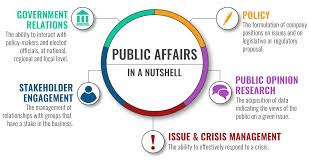Mastering Government Relations: A Key Strategy for Business Success
The Importance of Government Relations in Business
Government relations, also known as public affairs or public relations, plays a crucial role in the success of businesses operating in today’s complex regulatory environment. It involves building and maintaining relationships with government officials, policymakers, and other stakeholders to influence decisions that impact the business.
Businesses cannot operate in isolation from the government. Regulations, policies, and legislation set by the government can have a significant impact on a company’s operations, profitability, and reputation. Therefore, establishing strong government relations is essential for businesses to navigate these challenges effectively.
There are several key reasons why government relations are important for businesses:
- Regulatory Compliance: Governments establish laws and regulations that businesses must comply with. Maintaining good relations with government officials can help businesses stay informed about upcoming regulations and ensure compliance.
- Policy Advocacy: Businesses often need to advocate for policies that support their interests. Effective government relations can help companies influence policy decisions in their favour.
- Risk Mitigation: By engaging with government stakeholders proactively, businesses can anticipate regulatory changes and mitigate potential risks to their operations.
- Market Access: Government relations can help businesses gain access to new markets by facilitating trade agreements or resolving regulatory barriers.
- Crisis Management: In times of crisis or controversy, strong government relations can help companies manage their reputation and navigate sensitive issues effectively.
In today’s globalised economy, businesses need to understand the political landscape and engage with governments at various levels to protect their interests and promote their growth. Building effective government relations requires transparency, credibility, and a commitment to ethical practices.
Ultimately, businesses that invest in building strong government relations are better positioned to succeed in an increasingly interconnected world where governmental decisions have far-reaching implications on business operations.
Effective Strategies for Navigating Government Relations: Six Key Tips
- Maintain open and transparent communication with government officials.
- Stay informed about relevant laws, regulations, and policies.
- Build strong relationships with key stakeholders in the government.
- Participate in consultations and provide feedback on proposed legislation or regulations.
- Comply with all legal requirements and ethical standards in your interactions with the government.
- Consider hiring a professional lobbyist or consultant to help navigate government relations.
Maintain open and transparent communication with government officials.
To effectively navigate the complexities of government relations, it is crucial for businesses to maintain open and transparent communication with government officials. By fostering a relationship built on honesty and clarity, businesses can establish trust and credibility with policymakers. This approach not only helps in staying informed about regulatory changes and policy decisions but also allows companies to proactively address any concerns or issues that may arise. Open communication promotes mutual understanding and collaboration, creating a solid foundation for productive engagement with government stakeholders.
Stay informed about relevant laws, regulations, and policies.
To effectively navigate the intricate landscape of government relations, it is crucial for businesses to stay informed about pertinent laws, regulations, and policies. By keeping abreast of the latest developments in the regulatory environment, companies can proactively adapt their strategies and ensure compliance with changing requirements. This proactive approach not only demonstrates a commitment to good governance but also positions businesses to engage constructively with government stakeholders and advocate for policies that align with their interests. Stay informed, stay compliant, and stay ahead in the realm of government relations.
Build strong relationships with key stakeholders in the government.
To effectively navigate the intricacies of government relations, it is crucial for businesses to build strong relationships with key stakeholders in the government. By establishing trust and open lines of communication with policymakers, officials, and decision-makers, businesses can better understand regulatory processes, advocate for their interests, and influence policy decisions that impact their operations. Cultivating these relationships not only enhances a company’s reputation but also paves the way for successful collaboration and strategic engagement with government entities.
Participate in consultations and provide feedback on proposed legislation or regulations.
Participating in consultations and providing feedback on proposed legislation or regulations is a crucial tip for effective government relations. By actively engaging in the consultation process, businesses can have a direct impact on shaping policies that affect their operations. Offering constructive feedback allows companies to voice their concerns, suggest improvements, and advocate for regulations that support their interests. This proactive approach not only demonstrates a commitment to compliance and good governance but also strengthens relationships with government stakeholders by showing a willingness to collaborate and contribute to the decision-making process.
Comply with all legal requirements and ethical standards in your interactions with the government.
It is essential for businesses to adhere to all legal requirements and ethical standards when engaging with the government. By maintaining compliance with regulations and upholding ethical practices in interactions with government officials, companies can build trust, credibility, and a positive reputation. Ensuring transparency and integrity in government relations not only demonstrates a commitment to good governance but also helps businesses navigate regulatory complexities effectively and avoid potential legal or reputational risks. Compliance with legal and ethical standards is fundamental to fostering strong relationships with the government and safeguarding the long-term interests of the business.
Consider hiring a professional lobbyist or consultant to help navigate government relations.
When it comes to navigating the complexities of government relations, businesses may find it beneficial to consider hiring a professional lobbyist or consultant. These experts bring a wealth of knowledge and experience in engaging with government officials, understanding regulatory frameworks, and advocating for their clients’ interests effectively. By enlisting the services of a professional lobbyist or consultant, businesses can access valuable insights, strategic guidance, and established networks that can help them navigate the intricate landscape of government relations with expertise and efficiency.



